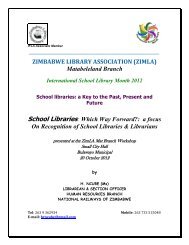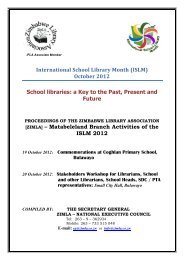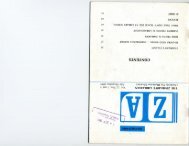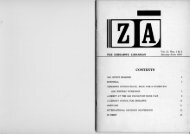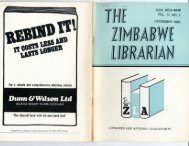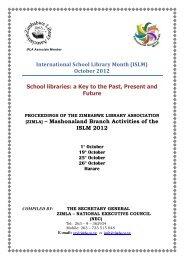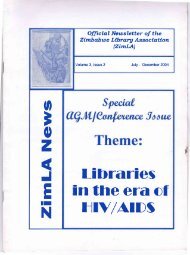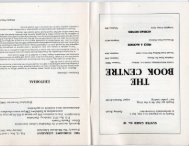A FORCE TO RECKON WITH - Zimbabwe reads
A FORCE TO RECKON WITH - Zimbabwe reads
A FORCE TO RECKON WITH - Zimbabwe reads
Create successful ePaper yourself
Turn your PDF publications into a flip-book with our unique Google optimized e-Paper software.
Conference '84<br />
ESTABLISHING EDUCATIONAL STANDARDS<br />
AND TRAINING FOR LIBRARIANSHIP<br />
THE PAST<br />
The Association has been involved<br />
since its earliest days with the development<br />
of libraries and therefore, directly<br />
or indirectly, with the preparation of<br />
librarians to staff these establishments.<br />
The Varley, Greenfield and Alison Reports<br />
and the Swedish Library Mission all had<br />
sections on the provision of education<br />
for librarians.<br />
In the seventies Ranche House College<br />
began to hold "crash courses" of a<br />
week extended to 10 days and then two<br />
weeks, for interested persons working<br />
full-time in libraries. The Association set<br />
up an Education Committee to monitor<br />
the content of the courses, liaise with the<br />
Ranche House authorities and provide<br />
qualified librarians as instructors for the<br />
courses. This function was extended to<br />
the courses run annually for the school<br />
librarians when these were instituted in<br />
1978.<br />
The Committee's brief also included<br />
keeping an eye on those undertaking<br />
correspondence courses with UN ISA<br />
and later it advised on the running of the<br />
City and Guilds courses begun at the<br />
Harare and Bulawayo Polytechnics in<br />
1977. The meetings of this Committee<br />
were gradually less well attended until at<br />
the end of 1981 only the Chairman and<br />
two members attended the last two<br />
meetings. The Committee has not met<br />
since then, and the Association appears<br />
to have been content to allow it to lapse.<br />
by Ann Podmore*<br />
In 1982 the Ministry of Education and<br />
Culture began to explore the possibility<br />
of establishing a national library service<br />
and an Education Committee under the<br />
chairmanship of Mrs June Smith was one<br />
of the five sub-committees which met to<br />
discuss particular aspects of the scheme.<br />
Several members of the Association<br />
were included on that sub-committee,<br />
but none as official representatives of the<br />
Association to act as spokesmen and<br />
present the views of the Association.<br />
Looking back, the Association, as such,<br />
had no official opinion or standpoint to<br />
present, which was a deplorable state of<br />
affairs. This sub-committee was convened<br />
to explore manpower needs and<br />
make recommendations for syllabus<br />
structure, but had no greater authority or<br />
recognition than that. Many of the<br />
recommendations put forward were<br />
accepted by the Ministry, but have<br />
received considerable adjustment and<br />
change since then.<br />
THE PRESENT<br />
It is very difficult to make any definite<br />
statement about the present, apart from<br />
the fact that Gweru has joined Harare<br />
and Bulawayo as a centre where a City<br />
and Guilds course is given. The course is<br />
still a one-year course but was considerably<br />
amplified and updated in<br />
1983. The Ministry of Manpower Planning<br />
has declared its intention of continuing<br />
with this course, and mentioned<br />
'Ann Podmore has been the Chairman of the<br />
ZLA Education Committee for several years.<br />
the desirability of phasing it out and<br />
replacing it with (possibly) a two-year<br />
course with greater emphasis on local<br />
needs and conditions, instead of the<br />
strong British bias it now has.<br />
In the Cabinet reshuffle of last year the<br />
Division of Culture was switched from<br />
Education to Youth and Sport as a parent<br />
ministry. Enquiries to that department<br />
resulted in the information that the<br />
current position is as follows:<br />
(1) The erection and completion of<br />
the headquarters of the<br />
National Library and Documentation<br />
Service in Harare is a<br />
priority;<br />
(2) The application for establishing<br />
posts for the Head of a Library<br />
School and two lecturers is<br />
before the Public Services<br />
Board for consideration of<br />
salaries and the gradings of the<br />
positions.<br />
The spokesman for the Ministry could<br />
provide very little other information<br />
apart from the fact that his department is<br />
trying to persuade the government that<br />
pressing ahead with facilities while neglecting<br />
the provision of personnel to staff<br />
them is negative, and that the two should<br />
proceed together. No further decisions<br />
seem to have been made regarding<br />
training facilities and recruitment of<br />
students.<br />
There is as yet no policy on any of the<br />
issues which will be outlined shortly. The<br />
whole area of training, indeed of the<br />
shape of libraries and librarianship in<br />
<strong>Zimbabwe</strong> appears to be undetermined<br />
at present, though what decision-making<br />
processes are operating are unknown.<br />
THE ISSUES<br />
Conference '84<br />
This is not an exhaustive list, but an<br />
attempt to explore the basic issues<br />
involved in education and training for<br />
librarianship.<br />
1) Who?<br />
a) Quality of Candidates and<br />
Selection<br />
Level of education is foremost but<br />
other qualities are important<br />
because the profession is also<br />
vocational. For example past experience,<br />
maturity, personality -<br />
especially not conforming to the<br />
traditional image of librarians as<br />
passive, retiring, ineffective or<br />
handicapped. An understanding<br />
of what the profession entails and<br />
a desire for commitment is also<br />
important.<br />
Adequate means of assessment<br />
and selection are required such as<br />
interviews, questionnaires, C.V.s,<br />
aptitude tests, references.<br />
b) Remuneration<br />
This is a vital aspect both during<br />
training and when qualified. Will<br />
support be adequate duringtraining<br />
and commensurate with the<br />
level of qualification and local<br />
salaries for jobs of comparative<br />
status and responsibility?<br />
2) What for?<br />
a) Specialisation?<br />
Librarianship training in <strong>Zimbabwe</strong><br />
will have to supply the<br />
manpower needs of the National<br />
Library and Documentation Service,<br />
including culture houses,<br />
special libraries in Government<br />
departments, school libraries,<br />
academic libraries and public<br />
libraries in small urban centres<br />
which have no independent obligations<br />
to provide library services.<br />
10<br />
11



